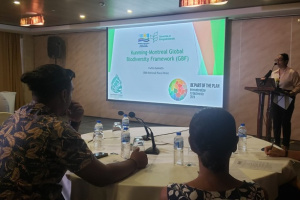Seychelles Meteorological Authority seeking more Seychellois to become weather forecasters

Amelie said SMA is hoping that the workforce will be mainly Seychellois by 2030. (Seychelles Nation)
The Seychelles Meteorological Authority (SMA) aims to localise its workforce by 2030 as part of its strategic plan, said a top official.
The authority's chief executive, Vincent Amelie, told SNA in an event to celebrate World Meteorological Day, that "We have quite a small team, of around 11 people, mostly made up of expatriates at the moment."
SMA recently recruited non-Seychellois forecasters who followed a training session, which Amelie said has familiarised them with working with the Seychelles' conditions and granting them the skills to work on their shift on their own.
"For the very small team that we are, it is very worrying that the majority of our staff are foreign," said Amelie.
To deal with the situation as part of its new strategic plan, the authority is sending two Seychellois persons for further studies in the field. Amelie added, "two people who will be returning to the country soon having completed their studies."
The authority also intends to sensitise young students to attract them to the profession and among the things they are explaining to the prospective meteo officers are the subjects they will need to study to make it into the field.
"With this new approach, we are hoping that the workforce will be mainly Seychellois by 2030," he added.
Amelie said that despite the localisation plan, the authority will always need the help and expertise of the non-Seychellois forecasters.
SMA was set up in 1971, with the opening of the Seychelles International Airport, as it is a prerequisite for the International Civil Aviation Organisation (ICAO), as well as the WMO, that all international airports are equipped with a weather watch station.
Its mandate is to provide early warning on weather, climate phenomena and tsunamis in Seychelles, and to provide meteorological services for international air and sea navigation.
It is also responsible for advising government and other agencies on meteorological matters and providing supportive roles and responsibilities to disaster management authorities in relation to disaster management, response and risk reduction.





